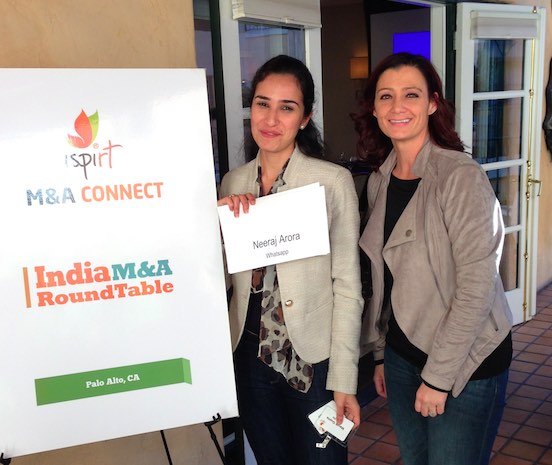M&A activity in the Indian startup ecosystem has, for a long time, remained fairly nascent. Relatively small exits, averaging $10-15M, are commonplace in India. But things are changing, and with India being the third largest startup ecosystem in the world, Silicon Valley giants are beginning to pay more heed to the entrepreneurs and IP emerging from India.
 On January 23, 2015, the iSPIRT M&A Connect Program hosted a Corp. Dev. and M&A Roundtable in Palo Alto. Attendees included corporate development, M&A and senior business unit folks from several key companies including Google, Yahoo, Twitter, Cisco, Intel, Box, LinkedIn, Intuit, etc. the event was coordinated by Sanat Rao (Partner, iSPIRT) and Roxna Irani (Associate, iSPIRT).
On January 23, 2015, the iSPIRT M&A Connect Program hosted a Corp. Dev. and M&A Roundtable in Palo Alto. Attendees included corporate development, M&A and senior business unit folks from several key companies including Google, Yahoo, Twitter, Cisco, Intel, Box, LinkedIn, Intuit, etc. the event was coordinated by Sanat Rao (Partner, iSPIRT) and Roxna Irani (Associate, iSPIRT).
Neeraj Arora (VP, Corporate Development – Whatsapp) was the keynote speaker, talking about his experience with the Facebook acquisition, key learnings and challenges he faced while closing the $22B deal with the tech giant. He repeatedly highlighted the importance of trust that the Facebook team built out with the Whatsapp team over the course of multiple years before the acquisition that eventually led to an extremely seamless process. He also emphasized the element of trust that a startup must establish with a potential acquirer, because nothing is more appealing to an acquirer than a startup’s commitment to their specific relationship. (So there’s monogamy in M&A too!)
 After an interactive session with Neeraj, we had a candid discussion with the Corporate Development attendees about their experiences acquiring Indian startups. The Yahoo and Twitter corp dev folks shared the key learnings from their recent M&As in India. Here are some takeaways for us in the Indian software product industry and for the next acquirers of Indian startups:
After an interactive session with Neeraj, we had a candid discussion with the Corporate Development attendees about their experiences acquiring Indian startups. The Yahoo and Twitter corp dev folks shared the key learnings from their recent M&As in India. Here are some takeaways for us in the Indian software product industry and for the next acquirers of Indian startups:
- Visible benefits when the target is a US entity. Given legal complexities, the difference in time and effort to close a deal with a US acquirer can vary substantially based on the legal domicile of the company. Recurring piece of advice of new startups is to register as a Delaware C-Corp.
- Acquisitions in India take time. Beyond geographic complexities, there are a couple of other reasons responsible. For one, communication can sometimes be ‘lost-in-translation’, so legal agreements with an Indian and a US counsel, with different laws and legal terminology, can often demand more fine-tuning than normal. Other times, key stakeholders may require more engagement and disclosure that demands resources. Whatever the reason, the general idea is to expect, and actively manage, longer cycles.
- Acquirer confidence in the core leadership of a startup is crucial. Acquirers often expect a strong management team to hire equally strong employees, so they see high quality leadership as a validation of high quality team and product. This is especially true in the case of Indian startups.
- Acquirers are looking for guidance on how to traverse the Indian ecosystem. India is a new market for a lot of overseas acquirers. A recurring request was for a “playbook” that would highlight the process and differences of doing an acquisition in India. This would include items as simple as list of top colleges in India to give acquirers context of pedigree, to employee attitude towards compensation (cash vs. equity breakdown), to examples of standardized termsheet terms and details.

The iSPIRT M&A RoundTable started 2015 with a bang. The year will be a pivotal one for tech startups in India and the iSPIRT M&A Connect Program is excited to accelerate the pace of change. With all the “Virtual Mandates” received from the Silicon Valley companies, we will make carefully targeted introductions to the Business Exchange Associates. And with a higher quality of interactions, we hope to make much a larger impact to corporates and startups alike..
Exciting times ahead… stay tuned!

